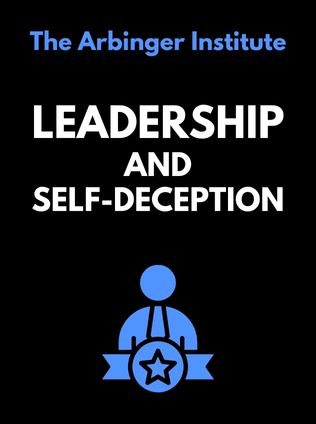
Leadership and Self-Deception
Getting Out of the Box
By The Arbinger Institute
Published 01/2000
About the Author
The Arbinger Institute is a collective of scholars, authors, and business professionals dedicated to helping organizations, families, and individuals overcome self-deception. Founded by James Ferrell, Duane Boyce, Paul Smith, and Terry Warner, the institute focuses on leadership and personal development. Their global influence stretches across the Americas, Europe, Africa, the Middle East, India, Oceania, and Asia. Through their innovative work, The Arbinger Institute has profoundly influenced the way leaders and organizations approach interpersonal relationships and organizational culture.
Main Idea
Leadership and Self-Deception: Getting Out of the Box by The Arbinger Institute explores the concept of self-deception and its profound impact on personal and professional relationships. The book reveals how individuals can blind themselves to their own flaws and motivations, thus sabotaging their efforts to achieve success and happiness. Through a compelling narrative, the authors demonstrate how to "get out of the box"—a metaphor for overcoming self-deception—and how this can lead to improved teamwork, conflict resolution, and personal growth.
Table of Contents
- Preface
- Part I: Self-Deception and the 'Box'
- Part II: How We Get in the Box
- Part III: How We Get Out of the Box
- Part IV: Leadership in and out of the Box
- Conclusion
Preface
The preface of Leadership and Self-Deception sets the stage for the reader by introducing the pervasive issue of self-deception. The authors highlight how self-deception affects every aspect of life, determining our experiences and the nature of our relationships. They liken self-deception to an infant who, while learning to crawl, gets stuck under furniture and continues to push harder, worsening her situation. This analogy powerfully illustrates how self-deception blinds us to the true causes of our problems, leading to ineffective and often damaging solutions.
"Self-deception actually determines one's experience in every aspect of life." - The Arbinger Institute
Part I: Self-Deception and the 'Box'
In the first part of the book, we meet Tom Callum, a new senior manager at Zagrum Co. Through Tom's experiences, the concept of being "in the box" is introduced. Being in the box refers to a state of self-deception where we fail to see our own role in problems and instead blame external factors. Tom's mentor, Bud Jefferson, helps him realize that he has a problem he cannot see—a problem of self-deception.
The narrative demonstrates how self-deception obscures the truth about ourselves and others, corrupting our view of reality. This distorted perspective hinders our ability to make wise decisions and undermines both personal happiness and professional leadership. Bud's examples and direct feedback help Tom start to recognize his own self-deception.
"The problem is that you don't know you have a problem." - The Arbinger Institute
Part II: How We Get in the Box
This section delves deeper into the mechanisms of self-deception. It introduces the concept of self-betrayal, which occurs when we act contrary to what we feel we should do for others. This betrayal leads to a distorted view of reality, justifying our actions and keeping us "in the box." Through a simple story of a parent deciding whether to get up to tend to a crying baby, the book illustrates how self-betrayal starts the cycle of self-deception.
Bud explains that when we betray ourselves, we begin to see others in a way that justifies our betrayal. For example, a husband who decides not to get up to soothe his crying child may start to see his wife as lazy or inconsiderate, even if she isn't. This self-justifying perspective distorts reality and keeps us trapped in the box.
Sign up for FREE and get access to 1,400+ books summaries.
You May Also Like
The Subtle Art of Not Giving a F*ck
A Counterintuitive Approach to Living a Good Life
By Mark MansonRich Dad Poor Dad
What the Rich Teach Their Kids About Money - That the Poor and Middle Class Do Not!
By Robert T. KiyosakiHow To Win Friends and Influence People
The All-Time Classic Manual Of People Skills
By Dale CarnegieFreakonomics
A Rogue Economist Explores the Hidden Side of Everything
By Steven D. Levitt and Stephen J. Dubner



















